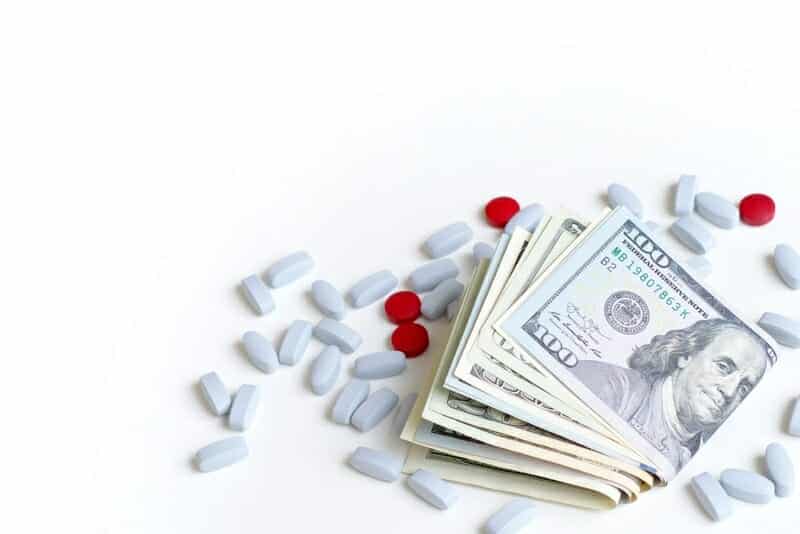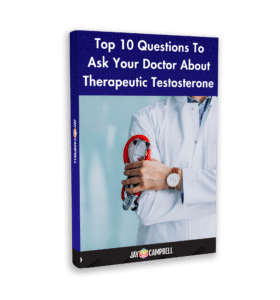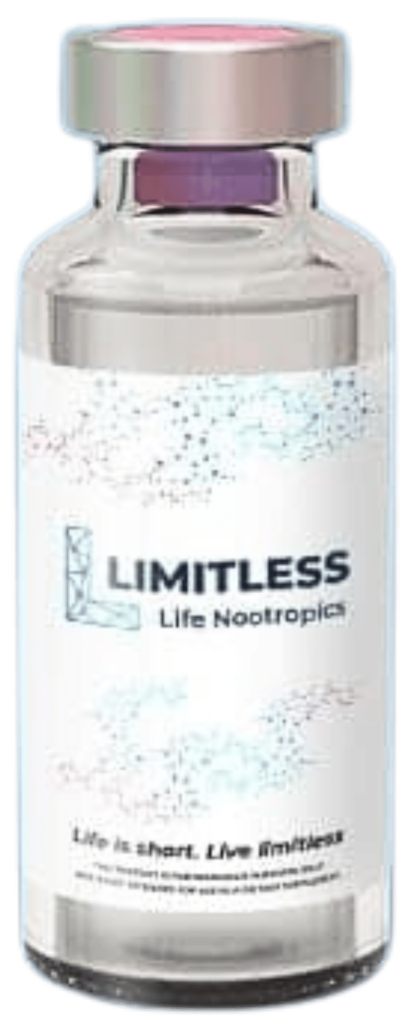Nearly five years ago, I called out the scam of testosterone-boosting supplements in my book The TOT Bible.
They are ALWAYS fradulent, so much so that their worthlessness alone is a “golden rule” of testosterone optimization therapy.
I even wrote this bit in 2016 when I published a short ebook on commonly-believed lies about therapeutic testosterone:
“You’ve been deluged with an endless stream of marketing gimmicks and hyperbolized ad campaigns all designed to sell you the latest and greatest “testosterone booster” supplement.
What if I told you nearly every one of them is a total scam?
In fact, they are nothing more than unproven snake oil sold to millions of unsuspecting men just like you who believe and buy into the hype.
The only thing these supplements have ever done is empty your bank account.”
My stance hasn’t changed and neither has the science supporting my position since I published the book.
But I still get bombbarded with questions dozens of times a week about the hottest new supplements that PROMISE to meaningfully increase your testosterone levels and keep them at fully optimized levels.
So in order to (hopefully) stop the same question reaching my email inbox and put these pathetic “products” to rest once and for all…
… it’s time for another Jay Campbell style debunking!
Table of Contents
ToggleWhy Do Supplements for Boosting Testosterone Levels Continue to Exist?
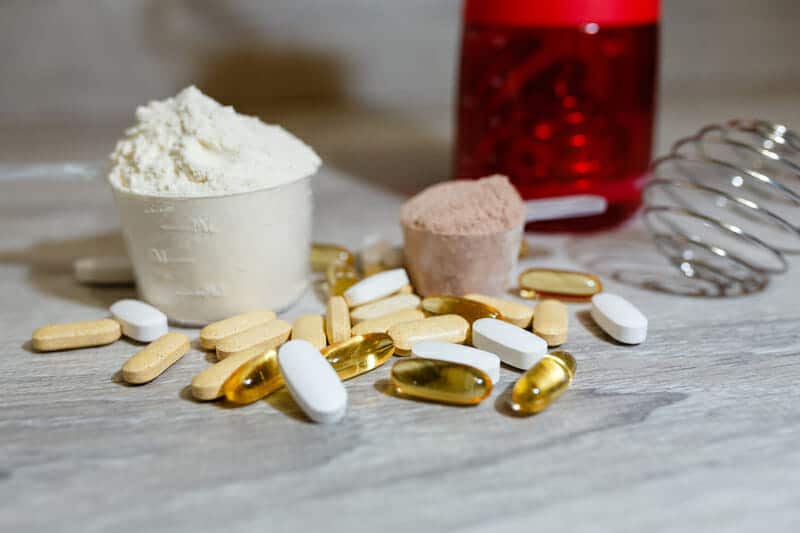
Why do people continually fall victim to these ads and spend significant amounts of money on “natural testosterone boosters” even though they continually end up being total scams?
These snake oil supplements do nothing but empty the wallets of millions of unsuspecting men who are naive enough to fall for the equivalent of a magic pill to solve their health problems.
And yet… the grift continues profitably, with the global market for these products estimated to be at ~$306 million in 2022 (and a compound annual growth rate of 5.6% between now and 2030).
Not surprising when you consider the epidemic of chronically low testosterone levels remains largely unsolved:
“Increasing prevalence of testosterone deficiency is expected to drive the global testosterone booster market growth over the forecast period.
For instance, according to data published by Frontiers Media S.A. in January 2020, it was stated that approximately 40% of men over the age of 45 and 50% of men in their 80s are hypogonadal.
Testosterone levels have been found to decrease by 100 ng/dL every 10 years or an average rate of 1–2% per year beyond age 30, which may further vary by adiposity, medications, and chronic disease globally.”
(NOTE 1: Do you or anybody with an ounce of awareness think that testosterone levels aren’t falling farther and faster than ‘1-2% per year after age 30’? I mean c’mon. All anyone has to do is look around to the crisis of low testosterone in global society.)
(NOTE 2: I want to emphasize the market I’m referring to is SOLELY for supplements promising to raise testosterone levels, and not bio-identical testosterone injected into your body)
And for this under-served population with their unsolved problems, the false promises made by the companies do not need to change:
“This herbal supplement will NATURALLY raise your total/free testosterone levels and keep them there without steroids or injections!”
“Bigger muscles, a larger penis, improved sex drive, more confidence, lots of women in your bedroom, less body fat, incredible workout pump, ridiculous strength gains, no more b*tch tits, and everything else you could possibly desire”
Even with all this, you would think the companies selling these supplements would eventually go out of business and the all-too-naive consumer would take the hint after being ripped off more than once.
WRONG!
There are several factors behind the popularity of testosterone-boosting supplements:
- INSTANT GRATIFICATION CULTURE – Why dedicate yourself to a testosterone-optimized lifestyle for years on end when you can just become an overnight success and get the quick fix in 60 days or less?
- YOUTH IS WASTED ON THE YOUNG – There will always be a very large cohort of impressionable young men in their teens and early twenties who are in awe of extreme muscularity and will therefore believe every word coming out the mouths of YouTube fitness gurus
- DECADES OF MEDIA MISINFORMATION – Many people still erroneously believe therapeutic testosterone is equal to “juicing” or “anabolic steroids”, buying into the false narrative of dangerous side effects and making them less likely to undergo proper hormone optimization.
- LACK OF AWARENESS – Most men are completely unaware their testosterone levels are below normal, let alone the fact their levels have been on the decline for several years.
Hell, you have supplement salesmen recommending testosterone boosters to teenagers who don’t know their own ass from last Tuesday:
“Research personnel posing as 15-year-old high school athletes seeking to increase muscle strength contacted 244 health food stores in the United States via telephone. Researchers asked the sales attendant what supplements he/she would recommend.”
“…A total of 9.8% (24/244) of sales attendants recommended a testosterone booster. Regarding availability for sale, 41.4% (101/244) stated one could purchase a testosterone booster.”
Put all of the above information together and you have the perfect formula for a ridiculously profitable yet evergreen market with a consistently large and ALWAYS GROWING customer base of fools.
For every one person who matures and sees the light, there will be 5 new people who are brand new to the world of fitness and will fall for the testosterone-boosting scam like their predecessors once did .
The Scientific Literature Does NOT Support Testosterone Boosters, and With Good Reason
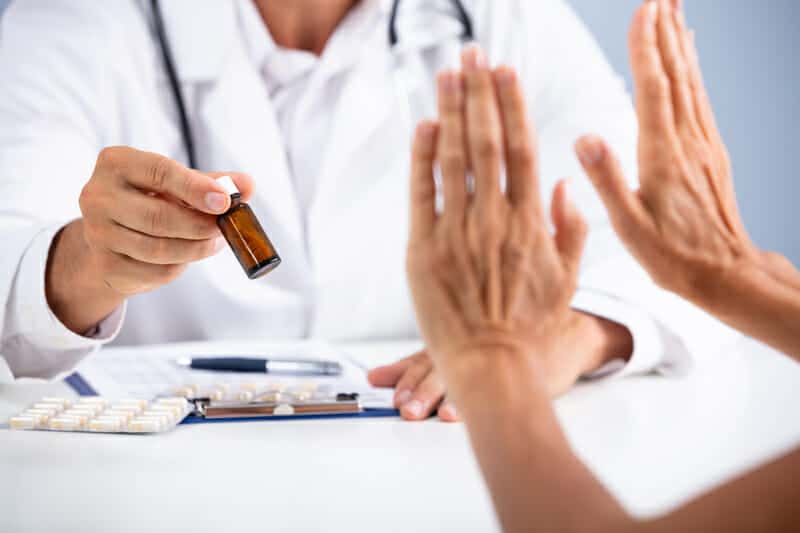
If testosterone boosters consistently worked as well as they claim to and delivered on their promises, I and my network of the world’s top Hormone Optimization physicians would literally be out of business overnight.
Why would I have wasted my ENTIRE LIFE becoming the world’s most prolific expert on everything and anything testosterone related, if you could just take a pill a day to fix all your physical ailments?
As my luck would have it, and as male biology dictates, life just doesn’t work that way.
Yet the supplement industry hawking these garbage testosterone boosters will never face accountability or come crashing down.
This is because these companies operate in a grey area called “The Wild Wild West”where they are effectively exempt from the strict rules and regulations that otherwise apply to medicinal products:
“Overdosing on testosterone-boosting supplements may also result in excessive testosterone levels and associated side effects. It’s especially easy with over-the-counter products, as their use is not monitored by a medical professional. What’s more, many testosterone-boosting ingredients have not been thoroughly researched and may carry unknown risks.
“Many supplements are not regulated by the FDA (US Food and Drug Administration) or in the UK by MHRA (Medicines and Healthcare products Regulatory Agency).
Furthermore, such supplements could even lower natural testosterone levels in the body. How? Some testosterone boosters can contain ‘pro-hormones and or SARMS’ that mimic testosterone. By doing this, your body thinks it doesn’t have to produce its own anymore.”
(You’ll soon see how “excessive testosterone levels” is literally impossible to achieve with mega-doses of these supplements, but the rest of the quotation stands)
A large 2020 review of fifty popular testosterone boosters found the majority of them contain ingredients that either do NOTHING to change testosterone levels or simply don’t have any data whatsoever:
“Ninety percent of supplements claimed to “boost T”, 50% “improve libido”, and 48% “feel stronger”. One-hundred nine unique components were found, with a mean number of 8.3 per product.
On PubMed, 24.8% of supplements had data showing an increase in T with supplementation, 10.1% had data showing a decrease in T, and 18.3% had data showing no change in T. No data were found on 61.5% of supplements on their effect on T.
Supplements contained a median 1,291% of the RDA for vitamin B12, 807.6% for vitamin B6, 272% of zinc, 200% of vitamin B5, and 187.5% of vitamin B3. Thirteen products exceeded the US Food and Drug Administration UL of ingredients (zinc, vitamin B3, and magnesium).”
Another review published in the same year specifically looked at the top 5 highest-rated and most frequently reviewed testosterone-boosting supplements being sold on Amazon.
But the most surprising finding is what happened once the illegitimate reviews for these products were removed:
“Nineteen unique ingredients were identified across these T-Boosters, and literature review revealed 191 studies involving the 10 most common ingredients, of which 19% involved human subjects, 53% animal models, 15% in vitro studies and 12% case reports or review articles. Amongst 37 human studies, 30% observed an increase in T levels, 3% a decrease, 46% no effect, and 22% were indeterminate.
Analysis of top customer reviews from the first two pages of reviews for each supplement revealed differences in ADAM [Androgen Deficiency in the Aging Male] score before and after ReviewMeta.com filtration [elimination of untrustworthy comments].
After filtration, there was a 91% decrease in users reporting increased libido, a 59% decrease in reports of increased energy, a 93% decrease in reports of improved strength/endurance, a 60% decrease in reports of improved erections, an elimination of reports of improved work performance, a 67% decrease in reports of improved sleep, and an 89% decrease in reports of improved sports ability.”
Let’s go one level deeper… if you analyze these supplements at the level of the individual ingredients, the clinical evidence for boosting testosterone levels is severely lacking:
“After review, 16 ingredients were identified from the top 16 listed male testosterone supplements. The most commonly used ingredients were Aspartate, Eurycoma longifolia, Fenugreek, L-arginine, Tribulus, and Zinc.”
“…While, 13% of ingredients in this study were given A grades [strong positive evidence with net positive evidence in two or more randomized-controlled trials], 81% of ingredients received grades that determined their evidence was indeterminate (C grade) or completely lacking/negative (D grade)”
So with all this in mind, it’s pointless to worry about if your testosterone booster uses “clinically proven and clinically dosed” ingredients if the evidence shows the ingredients themselves are worthless.
Even the scammy “health as a subscription” websites will tell you the same thing:
“Testosterone supplements *may increase* your testosterone levels by a small to moderate amount, but they’re unlikely to treat very low testosterone or produce huge changes in your sex drive.
If you have clinically low testosterone, it’s better to talk to your primary care provider or a urologist than rely on over-the-counter supplements.”
(I kind of spoiled the summary of the article, but you probably already knew this anyway)
In conclusion:
The cold hard truth is that there’s little to NO SCIENTIFIC EVIDENCE which supports the claims made by supplement companies about their testosterone boosters actually raising testosterone levels.
And in the supplements that do show a rise in levels, they are never anything more than transient.
And more importantly, THEY DO NOT raise or maintain levels to *OPTIMIZED* like a surgical dose of bio-identical therapeutic testosterone does.
No matter what these dietary supplements claim or imply, they simply won’t provide your body with the lifelong fix it desperately needs.
Unlike the pharmaceutical industry, which is heavily regulated and requires backing all medical claims with rigorous evidence, the supplement industry is free from the burden of proof when it comes to their claims.
Good luck finding out if the ingredients used actually work!
But that’s why I’m writing this article… you’ll get your answer right now.
The “Testosterone-Boosting” Supplements That Don’t Work
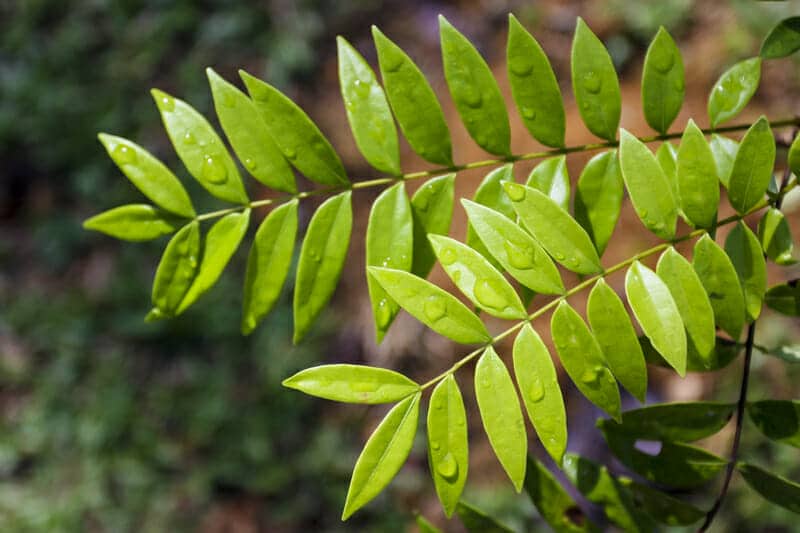
I want to briefly look at some of the most popular herbal ingredients commonly testosterone-boosting supplements, and show you why using them to meaningfully raise testosterone levels is a pointless endeavor that will fail every single time.
All of these have been thoroughly studied, tested, and proven to enact insignificant changes to your testosterone levels if we are being generous.
Fenugreek
Fenugreek (Trigonella foenum graecum) has been studied for its testosterone-raising capabilities due to its mechanism of action as an aromatase inhibitor and a 5-α-reductase inhibitor.
But as readers already know, it is DANGEROUS to continually inhibit the aromatase enzyme and the 5-α-reductase enzyme for numerous health reasons (read the linked article to learn more).
And the studies looking at Fenugreek, which seem impressive at first, are very lacking.
In a study published in 2009, 45 resistance-trained males took either 500 mg Fenugreek or a placebo daily for 8 weeks while engaging in a 4-day-per-week resistance training program.
At the end of the study, the researchers noted “no significant effects for groups or interactions were observed for the anabolic hormones free testosterone and estrogen”.
One 2010 study funded by a company that manufactures a Fenugreek-based workout supplement looked at 30 resistance-trained men who engaged in a double-blind trial where they took 500 mg Fenugreek or a placebo daily while engaged in a 4x/week resistance training program for 8 weeks.
And at the end of the trial, the average increase over the 8-week period in total testosterone was 6.75%.
If we do the math, it means a man with serum testosterone levels of 350 ng/dL would see an increase to 374 ng/dL.
A meaningless increase that is nowhere near enough to notice any significant benefits to health and/or well-being.
A 2011 study looked at 60 males ages 25-52 without erectile dysfunction who took either 600 mg Fenugreek or a placebo for six weeks… and while libido improved, nothing happened with testosterone levels:
“The average serum testosterone levels were similar for both groups: active treatment group, 14.8 nmol/L (±6.3), placebo group, 14.6 nmol/L (±5.6).
The serum testosterone levels remained within normal reference range after treatment in both the active treatment group (14.3 nmol/L (±5.8) and placebo group 13.1 nmol/L (±5.7)”
And what I’ve shown you above are just the studies I featured in The TOT Bible!
This 2016 study may have you fooled into thinking I didn’t look at all the available evidence:
“This was a double-blind, randomised, placebo-controlled trial involving 120 healthy men aged between 43 and 70 years of age. The active treatment was standardised Trigonella foenum-graecum seed extract at a dose of 600 mg/day for 12 weeks… Both total serum testosterone and free testosterone increased compared to placebo after 12 weeks of active treatment”
Except if you look at the first two rows of the data table below that I took from the study, the increases in testosterone are just pathetic to look at:
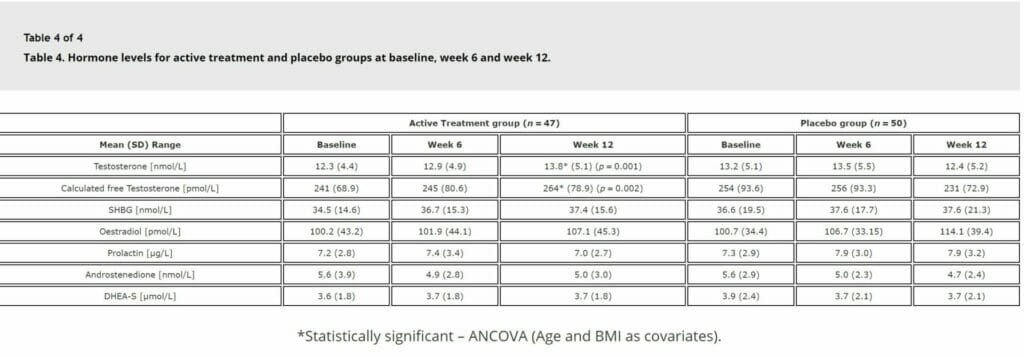
We can repeat this again with a separate 2017 study conducted under very similar conditions
“This one-arm, open-labelled, multi-center study was conducted in 50 male volunteers (age: 35 to 65 years) over a period of 12 weeks to determine the efficacy of FS (500 mg/day/subject) on free and total testosterone levels, sperm profile, sperm morphology, libido and sexual health, mood and mental alertness, and broad spectrum safety parameters.
…Free testosterone levels were improved up to 46% in 90% of the study population. 85.4% of the study population showed improvements in sperm counts”
Sounds impressive until you look at the data table:
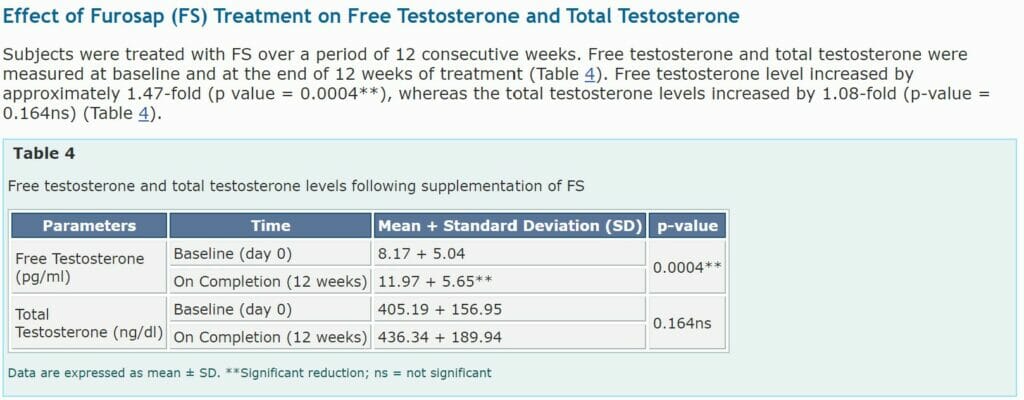
The pattern continues to repeat itself, even after a 2018 meta-analysis of four clinical trials looking at Fenugreek’s effect on serum testosterone and an additional 2021 clinical study examining Fenugreek’s testosterone-raising effects in 100 healthy men over 12 weeks.
The verdict is in: Fenugreek does ZIPPO for your testosterone!
Tongkat Ali
Tongkat Ali (Eurycoma longifolia) has also emerged as another popular herbal supplement for its supposed ability to raise testosterone levels.
Leaving out the studies done in animals, we’ll focus on the few trials done in humans.
A 2011 study looked at the effects of 200 mg of water-soluble Tongkat Ali per day on 76 men with late-onset hypogonadism.
And based on what was written, you would think it was a breakthrough:
“In fact, while before the treatment with the water-soluble Tongkat ali extract, only 10.5% (n = 8) of the patients did not show any complaints; this proportion increased to 71.7% (n = 54) after the treatment. The same improvement was observed for the serum testosterone concentration, which was normal in 35.5% (n = 27) before and in 90.8% (n = 69) of the patients after the treatment”
Except if you look at the graph below, it’s really not a breakthrough at all:
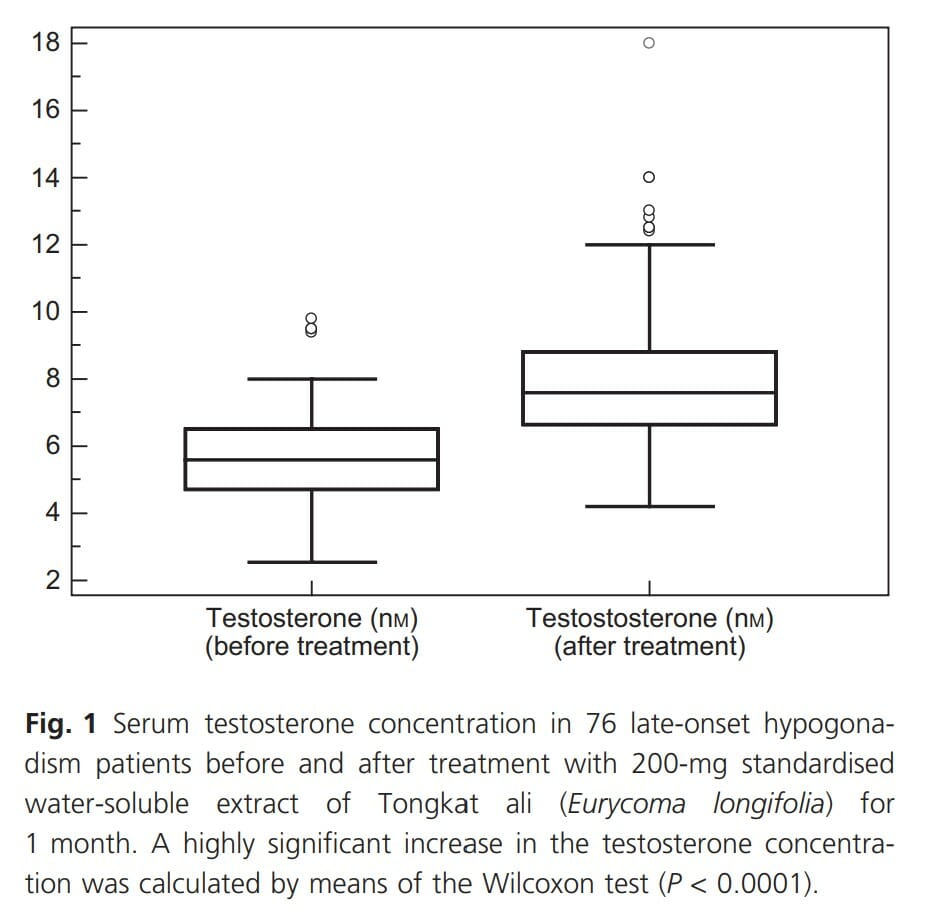
(A low testosterone concentration is lower 5.99 nm; while a normal testosterone concentration is between 6.00 and 30.0 nm)
If you crunch the numbers, the mean increase in serum testosterone levels in 76 men was the equivalent to 80 ng/dL… insufficient to notice any significant benefits when measured using the total testosterone measurement scale provided by Labcorp.
Then you have this 2013 study where 63 subjects suffering from moderate stress who were give a standardized hot-water extract of Tongkat Ali root (200 mg) or placebo daily for 4 weeks.
This time, the graph actually looks quite persuasive:
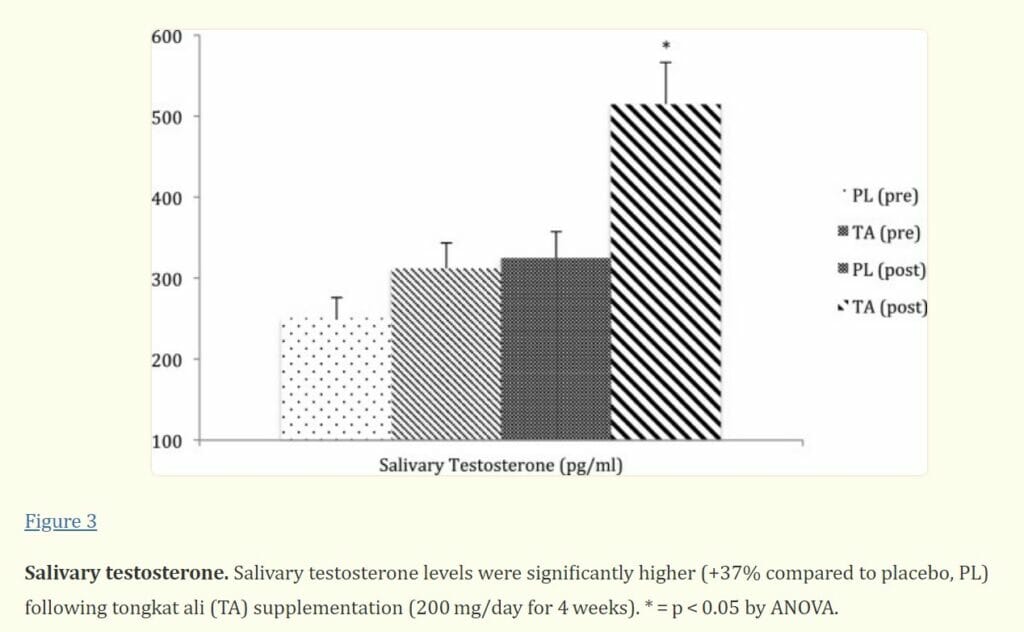
But those in the know are already aware that testosterone CANNOT be accurately measured through your saliva.
I talk about this in The TOT Bible:
“Progressive and experienced practitioners DO NOT order saliva testing for testosterone for the following reasons:
It’s limited to immunoassay techniques, much less sensitivity, less specificity due to cross-reaction sensitivities, certain foods (and smoking) alters results, adequate volumes are difficult to collect (especially past 40 years of age), any artificial stimulation of saliva flow alters concentrations of saliva solutes (including hormones).”
In the end, the results remain inconclusive.
And again, salivary enzyme tests are worthless for any biomarker measurement other than cortisol.
“But Jay, Andrew Huberman promotes Tongkat Ali all the time and claims……blah blah…..”
Thomas is a cool dude and even though I DO NOT agree with anything he says in this video (regarding Tongkat Ali), I’d like you to watch, so you can see Doctor Huberman even proves my point (and the point of this entire article itself) with his direct quote:
“Tongkat Ali works very well to increase testosterone levels anywhere from 100 – 200 points”
Guys and gals, if you know anything, anything at all about optimizing your Testosterone levels, you KNOW that a 100-200 point increase is UTTERLY MEANINGLESS in the big picture of becoming optimized in this totally contaminated world we are all living in.
I would love the opportunity to debate Doctor Huberman about the merits of Tongkat Ali vs a therapeutic testosterone dose.
If any of you can set that up, please email me ASAP. (I’ll be eagerly waiting).
Tribulus Terrestris
Our third featured plant extract is the Tribulus terrestris, which like the other two herbal supplements has zero scientific evidence correlating its use with a measurable increase in testosterone.
One of the first studies I found examining this supplement’s effect in humans involved a 2003 double-blind study examining 21 young men ages 20-36 who took either 10 mg/kg body weight of Tribulus terrestris, 20 mg/kg body weight of Tribulus terrestris, or a placebo daily for four weeks.
And as you can see in the results below, no meaningful influence was had on androgen production whatsoever:
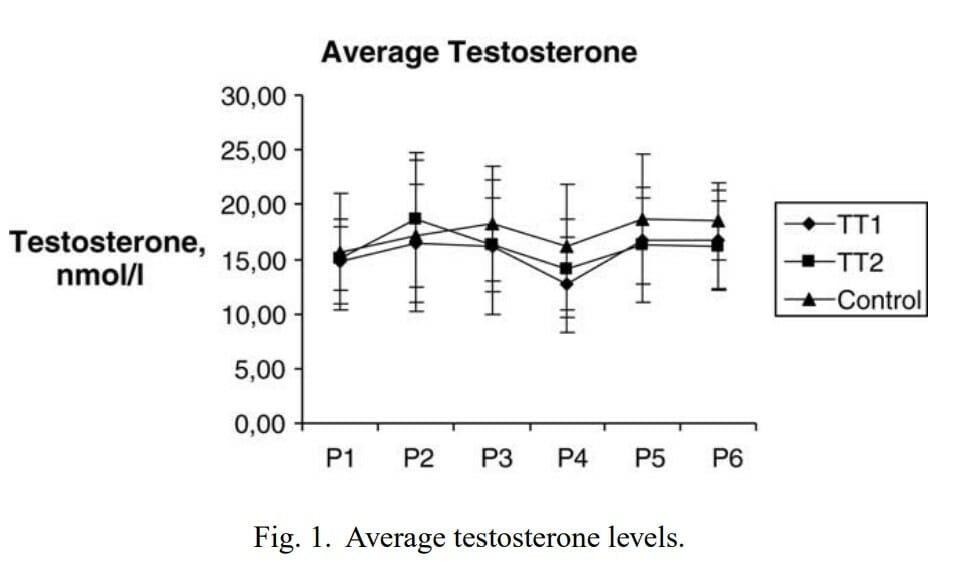
We can fast forward to another study in 2007, where 22 elite Australian male rugby players took 450 mg of Tribulus Terrestris or a placebo daily for 5 weeks straight.
And like the prior study, the results were disappointing:
“No between-group differences were noted in the urinary T/E [testosterone/estrogen] ratio. It was concluded that T. terrestris did not produce the large gains in strength or lean muscle mass that many manufacturers claim can be experienced within 5-28 days. Furthermore, T. terrestris did not alter the urinary T/E ratio and would not place an athlete at risk of testing positive based on the World Anti-Doping Agency’s urinary T/E ratio limit of 4:1.”
Note that a difference in lean body mass between the two groups would be an important qualitative indicator of higher testosterone levels.
Even more fascinating was a 2021 systematic review on Tribulus terrestris’ effect on testosterone, and the only effect was noticed when the plant was COMBINED with other androgen precursors:
“No significant changes in total testosterone levels were observed in either of the studies, however free testosterone levels were increased in two RCTs [randomized-controlled trials]
…the second RCT had free testosterone concentration increase of 31.88% in 30-year olds, 19.04% in 40-year olds, and 19.23% in 50-year olds when ingesting the herbal supplement and placebo control free testosterone concentrations had only slight increases at 1.38%, 0%, and a 2.08% decrease, respectively, when compared to baseline readings taken at week 0 for both arms of the study.
The third RCT only measured free testosterone levels in subjects and reported that there was an increase of 36.33% in the concentration of free testosterone in the supplement group and a decrease of 5.1% in the placebo group after 4 weeks.”
Again, small increases not worth bragging about.
To wrap up this supplement, a 2021 trial looked at 30 healthy males trained in CrossFit who received either 770 mg of Tribulus terrestris supplementation or a placebo daily for 6 weeks.
And while there were slight increases in testosterone levels immediately after a workout (moreso from the lack of testosterone depletion and again, ‘TRANSIENT’ in nature), the 6-week results show nada in terms of sustainable changes: (the furthest thing possible from ‘OPTIMIZATION’).
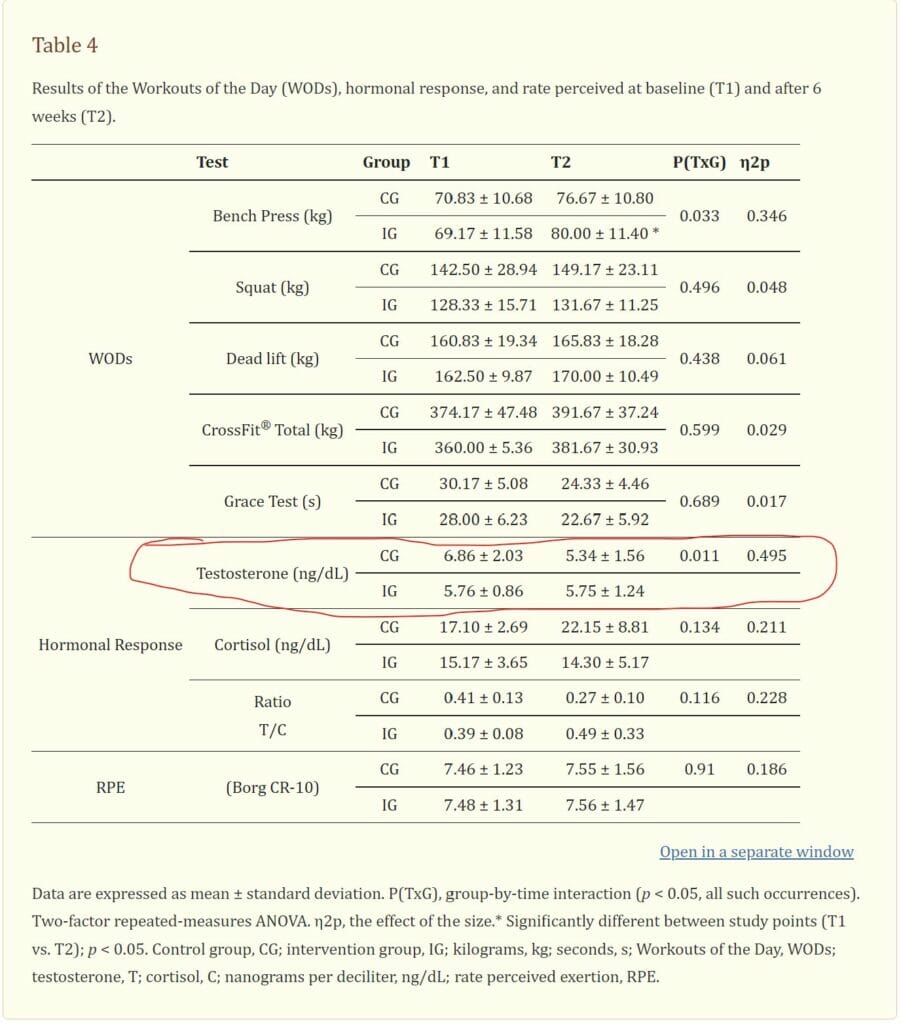
Notably, the authors had this comment to make:
“… the results could be influenced by type of exercise, amount of each supplement, and duration of the intervention. Participant characteristics, such as age, gender, ethnicity, body composition, training level, differences in training, nutrition, and health status, may also have influenced the results.”
So who’s up next to bat?
D-Aspartic Acid
D-Aspartic Acid is separate from the other prior supplements in that it is a naturally-occuring animo acid found within your tests, pituitary gland, and adrenal gland.
Since it has some degree of involvement in testosterone synthesis and release, logic dictates adding more D-Aspartic acid to your body should lead to a profound boost in testosterone levels.
An idea that sounds good in theory but ends up working terribly in practice, especially in the few human studies available.
In 2015, a study was done on 23 healthy male volunteers ages 27-38 where they took 3.12 grams of D-Aspartic acid every day for 12 consecutive days.
And while the increase in serum testosterone levels by 42% seems promising, the study itself is heavily flawed.
Indeed, no inclusion or exclusion criteria of the sample population were mentioned aside from the participants’ ages.
So similar to the CrossFit study we just looked at, we cannot truly determine if specific lifestyle factors (e.g. physical activity, supplementation, etc.) had any effect on the results.
To make matters worse, a study published in the same year involved a randomized double-blind study where 20 healthy resistance-trained men ages 18-36 (who had to bench press at least 100% of their bodyweight for 1 rep) took 3 grams of D-Aspartic acid, 6 grams of D-Aspartic acid, or a placebo for 28 days straight while lifting weights 4 times per week.
Surprisingly, too much D-Aspartic acid may be detrimental to testosterone levels:
“Total testosterone was significantly reduced in D6 [6 grams of D-Aspartic acid daily]. Analysis of free testosterone showed that D6 was significantly reduced as compared to D0 [placebo], but not significantly different to D3 [3 grams of D-Aspartic acid daily]. Analysis did not reveal any significant differences between D3 and D0. No significant correlation between initial total testosterone levels and responsiveness to d-aspartic acid was observed”
Let’s look at one final supplement as I think I’m repeating the takeaway message needlessly…
Zinc Magnesium Aspartate (ZMA)
While I don’t deny the link between low testosterone and a zinc deficiency, it’s important to clarify this link DOES NOT mean supplementing with zinc will fully optimize your testosterone levels.
If you are indeed deficient in zinc, you may benefit from adding it to your daily supplement regimen but just know the increase in testosterone will be minimal at best.
The same deal goes with the connection between overtraining and low testosterone levels, although adopting a smarter training routine and supplementing zinc won’t do anything to enhance your physical performance.
Because when you take care of the zinc deficiency and the overtraining problem, studies (here and here) show zinc has no significant effect on your testosterone levels.
And while a magnesium deficiency is equally important to take care of, it also won’t do anything for your testosterone.
This was observed in a 2010 study where 30 healthy males between the ages of 18 and 22 were divided into 3 groups for a total of 4 weeks:
“Group 1—sedentary controls supplemented with 10 mg magnesium (as MgSO4) per kilogram body weight.
Group 2—tae kwon do athletes practicing 90–120 min/day supplemented with 10 mg magnesium per kilogram body weight.
Group 3—tae kwon do athletes practicing 90–120 min/day receiving no magnesium supplements.”
The conclusion seems convincing at first read:
“Our results show that supplementation with magnesium increases free and total testosterone values in sedentary and in athletes. The increases are higher in those who exercise than in sedentary individuals.”
But again, the devil is in the details and the hard numbers show meaningless increases in testosterone:
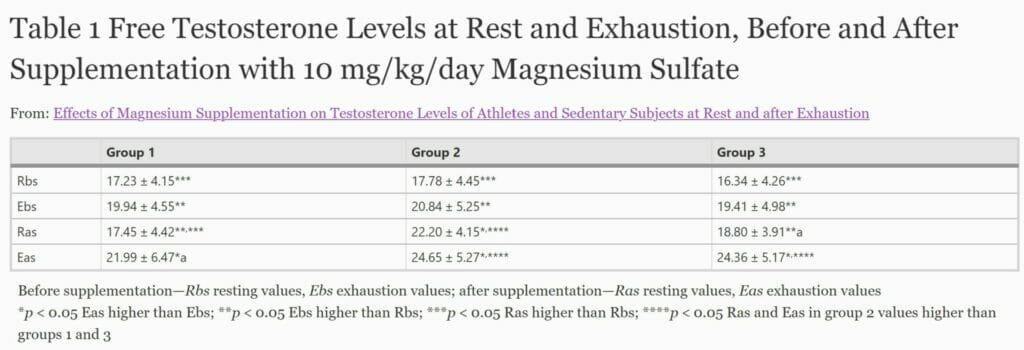

Combining zinc and magnesium (i.e. ZMA) doesn’t appear to solve the problem, according to a 2004 study where anabolism markers (which indicate muscle growth) in 42 resistance-trained males showed no increase in testosterone levels after 8 weeks.
So where does this leave us?
Why Can’t We Optimize Testosterone Levels Naturally?
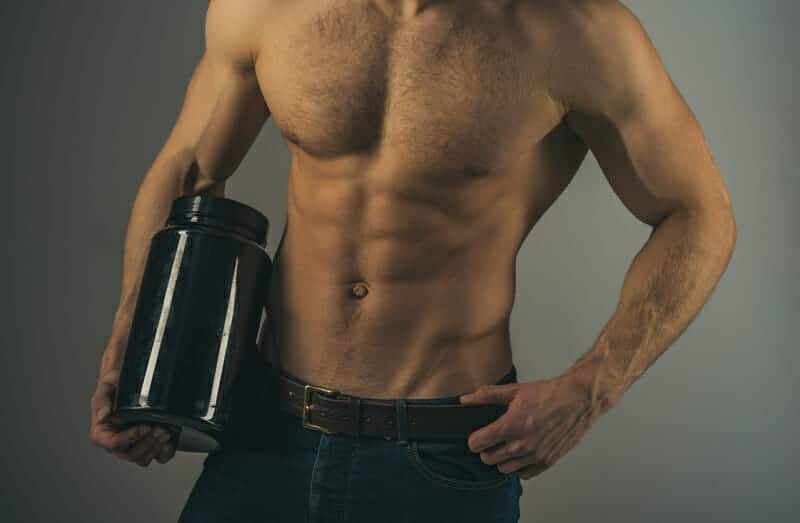
As I’ve mentioned thousands of times over the past 15 years of writing online, powerful factors in our modern-day environment are currently placing our endocrine systems under siege and overshadowing most men’s efforts to naturally fix their own testosterone levels.
That’s not to say living a fully optimized lifestyle won’t result in a modest increase in your testosterone levels.
However, due to what I just mentioned with regard to our endocrine systems, our ability to produce testosterone naturally while also remaining lean and healthy is dramatically reduced.
I talk about this in great detail in my deep-dive article on endocrine-disrupting chemicals (EDCs), but you’ve probably heard about commonly-occurring EDCs such as Bisphenol A and phthalates that wreak havoc on our hormonal health.
But at the end of the day…
The ONLY proven be-all, end-all way to raise and maximize your testosterone levels is through pharmaceutical means.
Yes, this means using therapeutic testosterone in the form of an injection or a trans-scrotal cream.
So don’t waste your time with testosterone-boosting supplements for the same reason you should never expose your balls to sunlight — they don’t work in the best-case scenario, and can likely harm you in the worst-case scenario.
“But What About Testosterone and Libido??”
Just one brief note before I end this article: There is a positive correlation between a higher libido and increased testosterone levels, but NOT causation.
In other words, increasing libido does not directly cause an increase in testosterone levels.
This is because your libido consists of WAY MORE than the amount of testosterone in your blood.
You have many hormones involved in the process, including estrogen, and you also have factors such as nitric oxide which play a significant role in arousal.
Something to think about the next time you want to buy a “sex-enhancing” supplement on Amazon!
What It REALLY Takes To Fully Optimize Your Testosterone Levels
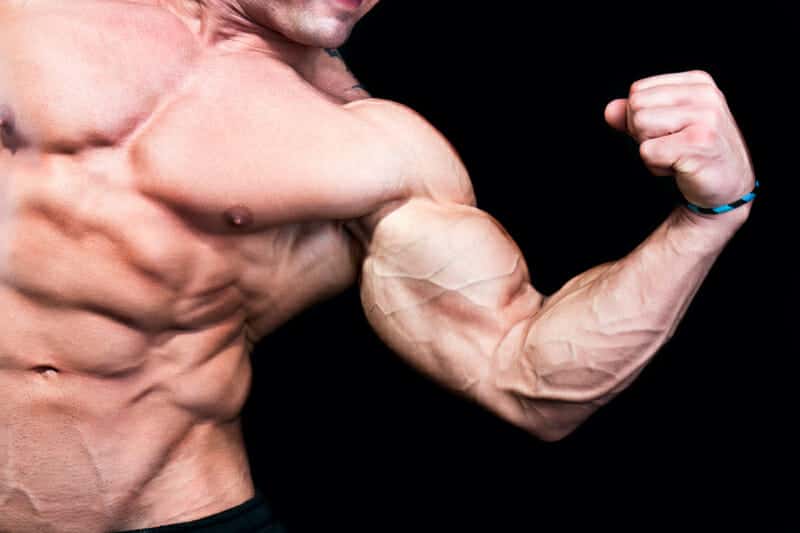
The evidence clearly points us toward a single conclusion:
Any increase in testosterone levels we see from herbal supplements (if any) is temporary, minuscule in scope, cannot always be attributed to the supplement alone and ‘most importantly’ will never optimize for lifelong health.
Sure, you could go for a meaningless total testosterone increase from 250 ng/dL to 330 ng/dL – a 32% increase – and still suffer from suboptimal levels of testosterone.
But with a prescription for therapeutic testosterone, you can take your total testosterone from 250 ng/dL to the top of the range plus at 1000 ng/dL – a 233% increase – and keep it there!
If you don’t believe me when I say the difference in how you feel at those higher ranges, is NIGHT AND DAY, go through Daniel Kelly’s journey of using testosterone 6 months in, 12 months in, 18 months in, and 24 months in!
And when you’re ready to experience the difference for yourself, my premium course TOT Decoded, lets you access +30 years of my personal knowledge about everything related to testosterone in an easy-to-access digital course.
Learn at your own pace and take full advantage of the checklists, client case studies, summaries, and exclusive guides to provide you with tip-of-the-spear intel on hormone optimization.
I’ll even help you get a head start with a 50%-OFF discount code, which you can access when you download the Top 10 Questions to Ask Your Doctor About Therapeutic Testosterone:
Raise Your Vibration To Optimize Your Love Creation!
PS – Want to get ahead of the hundreds of other scams and frauds corrupting the healthcare industry right now? Join The Fully Optimized Health Private Membership Group.
It’s your greatest opportunity to fully optimize your health and gain total access to me and my network of high-level men and women living their highest and best life.

